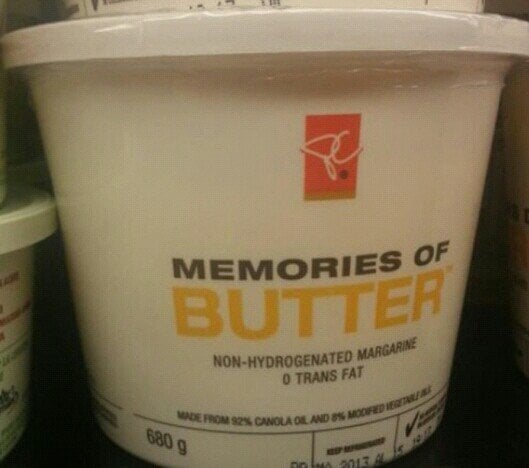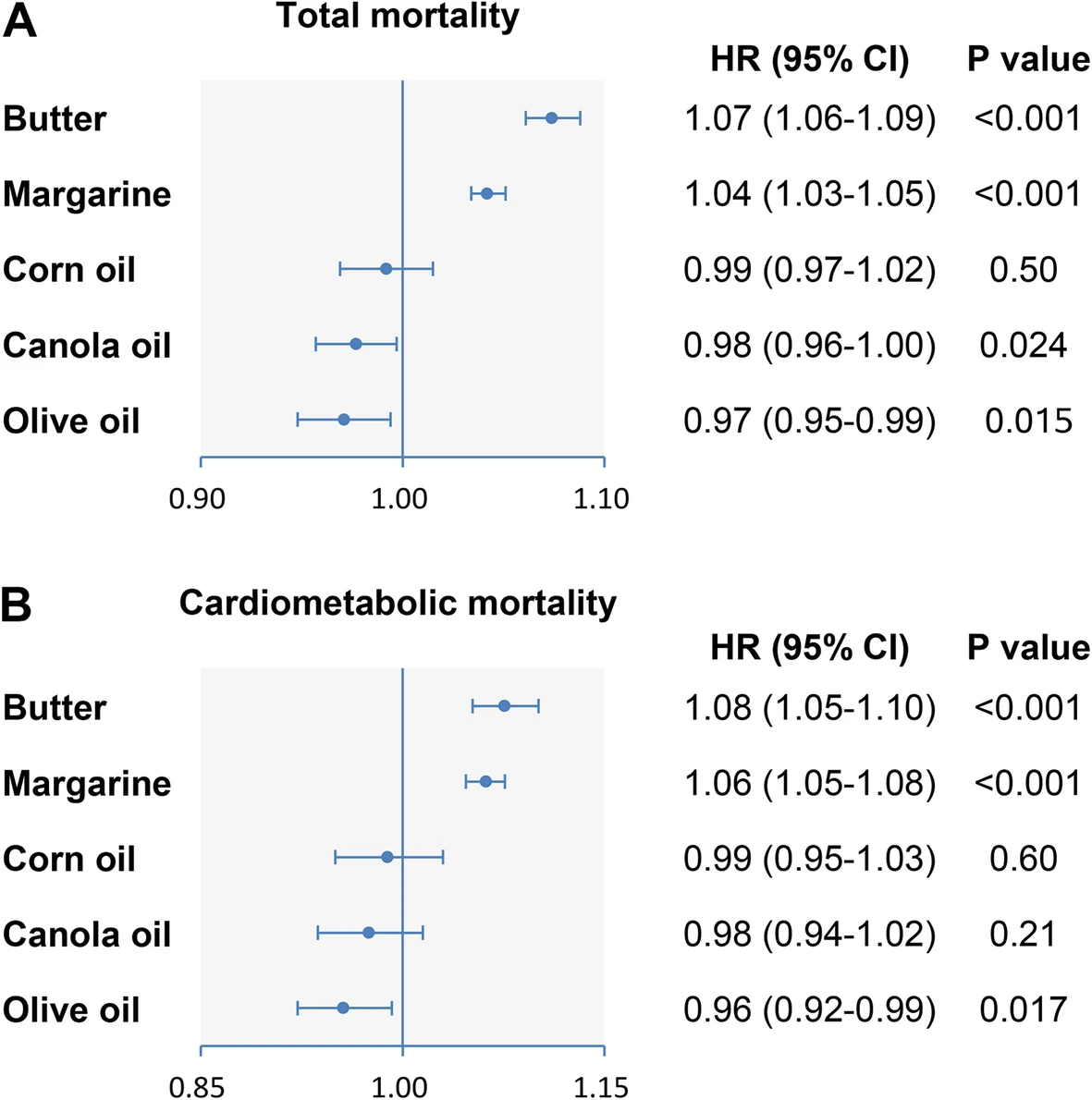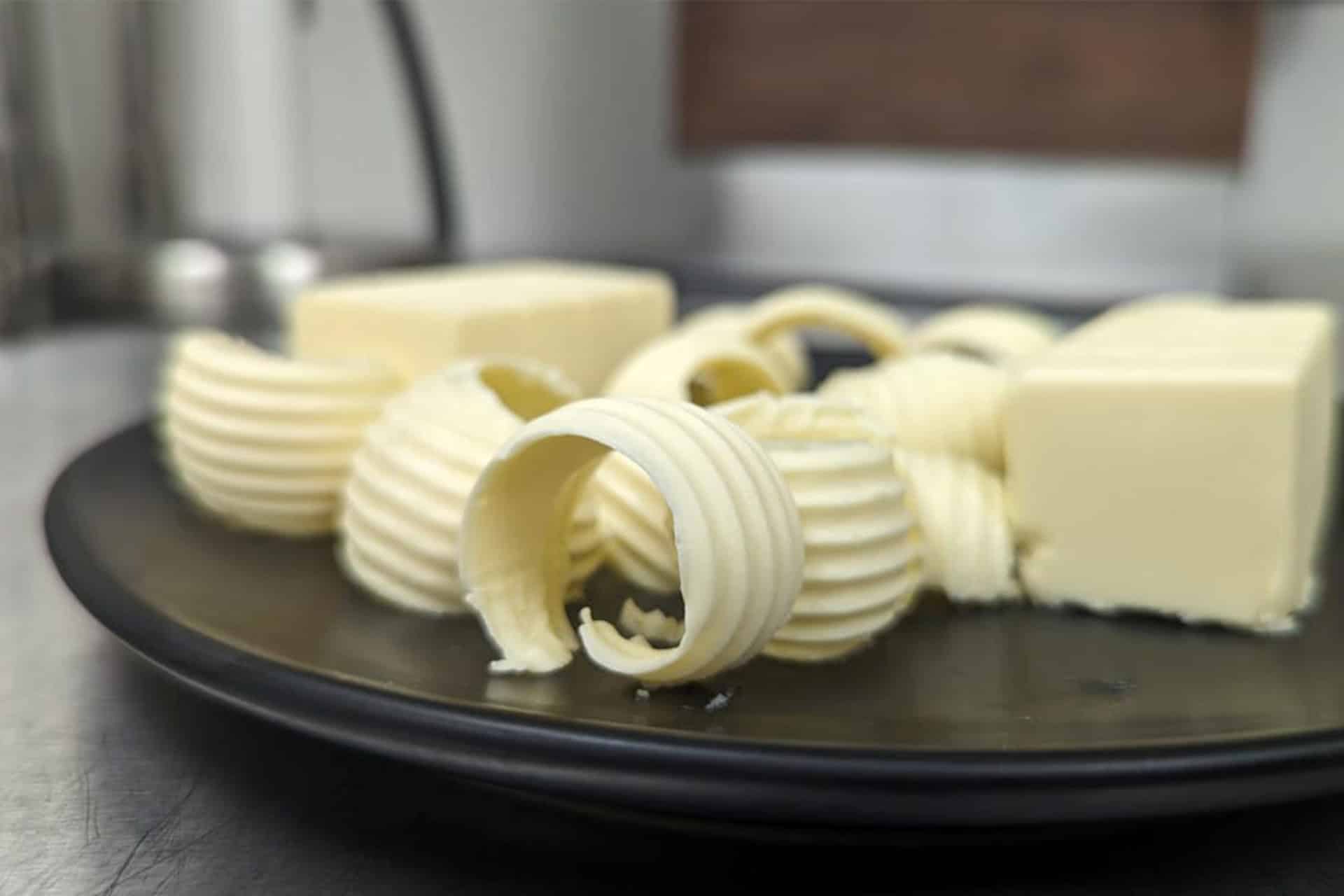A California-based startup called Savor has figured out a unique way to make a butter alternative that doesn’t involve livestock, plants, or even displacing land. Their butter is produced from synthetic fat made using carbon dioxide and hydrogen, and the best part is —- it tastes just like regular butter.
Guarantee that A) it doesn’t taste just like real butter, and B) it’ll make you shit yourself and bring a return of the label “may cause anal leakage”.
Does that mean it’s not a potentially viable product? No, it doesn’t. But let’s not bullshit.
What’s up with people talking about shitting themselves?
There was a run of fat replacement back (iirc) in the late nineties. Olestra was one of the name brands.
It wouldn’t digest at all, and it also wouldn’t mix in happily with the rest of the body waste in the colon. Hence, anal leakage becoming a phrase you would see on food labels.
And you would, sometimes, have not only leakage, but diarrhea. Sometimes violent diarrhea.
Basically, the oil was slippery enough to escape the anus no matter how tight it was. And there was a lot of it, under pressure from other waste behind it.
We’re in the presence of masters of the art of shitting one’s self
The problem with Olestra (the anal leakage oil alternative) is it’s a mixture of hexa-, hepta-, and octa-esters of sucrose with various long chain fatty acids. The resulting radial arrangement is too large and irregular to move through the intestinal wall and be absorbed into the bloodstream.
What Savor has supposedly created is chemically identical to the fatty acids in butter. It’s not made of new compounds, but made in a new way.
I get sick everytime I eat meat from Walmart. I fear bill gates butter will kill me.
I mean cool, but if farts release CO2 after digestion breaks down fats and proteins, then it’s not much of a carbon sink, is it? Not to mention the scale necessary to reverse climate change. We’d have make billions of barrels of the stuff, then pump it deep underground for long term sequestration. It’ll be so energy intensive we’ll require nuclear fusion.
Dead serious, I say we do it.
It’s not intended to be a carbon sink. It’s essentially intended to be a more carbon efficient way of producing margarine without having to grow e.g. palm oil and destroy forests. They thought, instead of making plants do the work of turning water and CO2 into fats, let’s just do it in the lab.
The basic science could work, although it’s usually tough to beat “put seeds into ground and wait” on pure cost. However the fact that they compare this to butter makes me sceptical. Given how wasteful growing a whole cow is just to make some milk fat, it’s easy to look efficient compared to that. They would compare themselves to sustainably produced margarine if they were honest.
It’s chemically identical to butter, so we wouldn’t need milk cows.
Most of the CO2 savings comes from not raising cows, you’re correct that the carbon capture in the butter wouldn’t matter that much due to digestion, but it is likely not all the carbon will be released as CO2 again.
Until we reach mass deployment of electrolyzers, all of this hydrogen will be coming from natural gas. Would be interesting to do a life cycle analysis and see what percentage of the CO2 emissions associated with producing the hydrogen end up incorporated into the product.
Finally, after years of research and experiments, the Savor team settled on a method that combines carbon dioxide from the air and hydrogen from water to make butter (synthetic fat) in the lab.
It’s a synthetic saturated fat, so basically a synthetic margarine. Butter is made from milk. So the headline should read “[…] makes ‘margarine’ out of water and CO2”, but everybody hates margarine, so I get why they chose butter instead.
Hey, I like margarine…
Really? I don’t mind it as a substitute for baking, but for eating on bread or using it to fry something I don’t think it comes even close to the flavor you get from real butter.
Oh, butter is better, sure, but my preferences are not mutually exclusive.
For example, I like salads without dressing, though salads with dressing taste better. Does that mean that we must ditch all salads without dressing? I hope not.
Give me Kerry Gold or give me death
~I can’t believe it’s not~ BUTTER
“I’ve tasted Savor’s products, and I couldn’t believe I wasn’t eating real butter. It tastes really good—like the real thing, because chemically it is.” Bill Gates recently wrote in his blog post.
If it’s chemically the same as butter, should we call it butter or something else?
“I can’t believe it’s not chemically manufactured butter!”

What on earth is that picture?
The largest (farm) landowner in the US is backing a venture that does not require land?
Smart investors diversify. Food production is a necessary industry.
During WW2, due to the food shortage, Germans did this using the carbon from coal… The process is old and known.
https://en.m.wikipedia.org/wiki/Margarine#Coal_butter
Let’s see if the process can be made more efficient this time. Allegedly, the product was virtually indistinguishable from butter.
Allegedly, the product was virtually indistinguishable from butter.
Well it says
Margarine made from them was found to be nutritious and of agreeable taste
Doesn’t sound indistinguishable to me.
It is just regular margarine, and for me, it is inedible. Tastes like vaseline.
Interesting way to get fat alternatives, people are already used to eating fake butter regularly, so it probably wouldn’t take much to add this to our diet.
It’s also closer to butter than butter alternatives. It’s not made to be more healthy, just more planet friendly.
Fake food is going to be more healthy than the real deal?
Sure buddy
I wrote it’s not made to be more healthy, because that’s the current marketing of butter alternatives. This isn’t claiming to be more healthy. The compounds are the same as the fatty acids in butter.
It’s simply a way to get butter while reducing carbon dioxide, rather than increasing it.
If it’s chemically identical, what does it matter if it’s come from dairy, this process, or a Star Trek replicator?
Fake medicine is going to be more healthy than the real (plant) deal? Sure buddy.
They said it’s NOT made to be more healthy.
It won’t be, it’s processed shite
So is any meat, mayonnaise, even butter is processed. Ever went into a fast food chain? Most ingredients are processed to the bits.
You better not take any medicine, that super processed? And Coca cola or any energy drinks? Bleh, made in labs!
I guess you only eat whole grains collected by you, that must suck.
Dam y’all really getting bent on shape over this lol
OKAY
This fallacy is called an appeal to nature.
It is also a fact that butter is a staple food that has been used for thousands of years with a proven track record.
This fallacy is called an appeal to tradition.
Just because something is fallacy the way it was presented does not make it wrong if he facts check out :)
Your facts don’t check out, that’s what makes you wrong. Fallacies are just the symptom.
This may be a logical fallacy known as false equivalence, when one fact is stated or implied to be conflated with another not directly related fact.
It’s not made to be more healthy, just more planet friendly.
Good or bad, it’s still processed food.
That’s my half-assed neutral statement. I choose not to eat processed foods. As long as there’s disclosure, I don’t care.
What people eat or don’t eat is their business.
So this new carbon sequestering program is going to be kind of a good news / bad news thing. …
There are ≈950 gigatons of excess CO2 in the atmosphere 27% of that by weight is carbon, the us population is 333milion, so if every American eats 770lbs of carbon sequestered butter we will solve climate change.
Just got to start deep frying our steaks in this new butter and we’ll get there in no time
Of course the danger is that this is cancelled out by increased carbon emissions from a making a commensurate amount of toast.
why do rich people want to replace any living being with a silicon version ?
Gates took billions to reinvent the cow. My guess is that Bill wants to own all that land and crops that cows eat because he is a fucking moronic hoarder.
Cows are one of the worst things for the environment. Massive production of methane at the cost of more water and land than any other protein source. Getting rid of methane works be the quickest way to dent global warming given how much worse than carbon it is (in the near term )
why do rich people want to replace any living being with a silicon version ?
Because then they can patent it.
So it’s no surprise that Bill “Anti-Food-Security” Gates, the world’s most famous patent racketeering parasite, has his vile little fingers in this.
Liberals fucking furiously downvoting in defense of the oligarch that personally ensured Covid vaccines would be monopolized.
Children furiously wanting to believe the world is black and white.
Yes, you are.
They were not there when he literally stifled innovation and ruined thousands of companies and lives…
Seems his pr people have done great work over the last 20 years.
Cattle farming methane is a massive contributor to the greenhouse effect. This process would reduce methane output as well as consume carbon dioxide, another greenhouse gas. It would help us in our fight against climate change.
Well, if it’s all being sold for consumption, it would be net zero carbon change for the product itself plus whatever carbon it takes to drive production.
The main advantage is the reducing the reliance on beef.
Though I gotta wonder how much demand can go down before the price reduction makes producing the volume of beef no longer worth it and only profitable if it’s scaled down because until then, they’ll just lower prices to keep producing the same amount or more because you’re a failure if line doesn’t go up.
Looks like saturated fat. Don’t eat it. Queue ketobro pseudoscience.

Multivariable-adjusted hazard ratios of total and cardiometabolic mortality for 1-tablespoon/day increment in cooking oil/fat consumption. Forest plots show the multivariable HRs of total (a) and cardiometabolic (b) mortality associated with 1-tablespoon/day increment in butter, margarine, corn oil, canola oil, and olive oil consumption. HRs were adjusted for age, sex, BMI, race, education, marital status, household income, smoking, alcohol, vigorous physical activity, usual activity at work, perceived health condition, history of heart disease, stroke, diabetes, and cancer at baseline, Healthy Eating Index-2015, total energy intake, and consumption of remaining oils where appropriate (butter, margarine, lard, corn oil, canola oil, olive oil, and other vegetable oils). Horizontal lines represent 95% CIs
Cooking oil/fat consumption and deaths from cardiometabolic diseases and other causes: prospective analysis of 521,120 individuals https://bmcmedicine.biomedcentral.com/articles/10.1186/s12916-021-01961-2/figures/1
I know an entire village who eat eggs scrambled in butter everyday and they still live ~80 years.
There’s so much factors at play here, take the numbers with a grain of salt. Remember the thing with eggs and cholesterol?
The “thing” with cholesterol is that the science wasn’t actually wrong. Eating foods laced with cholesterol is indeed unhealthy, which is why everyone thought cholesterol was to blame. Turns out that cholesterol is not to blame. The real culprit was saturated fat. Coincidentally, saturated is most concentrated in animal products, which also contain cholesterol. Oops. Well, we knew something in there was destroying people’s cardiovascular systems.
But hey, all that would require knowing biochemistry and that is just too inconvenient for most folks. Easier to treat food as a religion.
I do remember, yes. Eggs are still bad, high cholesterol levels are still bad, eggs still raise cholesterol levels. TMAO is still bad. Eggs still raise TMAO.
Industry pseudoscience is exceedingly dangerous. What the egg industry studies (and their friends in cheese) do usually is to swap their object of desire with something else that raises cholesterol; or they use people who already have high cholesterol. Most people aren’t aware that there’s a cholesterol plateau which, if already achieved, hides dose effects.
take the numbers with a grain of salt.
oh, and salt is still bad.
Salt is quite possibly the single most important nutrient we take in. Well, sodium is anyway. Is too much salt bad? Sure. That’s what “too much” means. Too much sun is also bad but a little is required for vitamin D production.
Being so reductive with your claims makes the rest of your argument less compelling.
Like I said, queue ketobro pseudoscience.
Sodium-potassium pumps are pseudoscience, got it.
Humans didn’t exist before salt mining, got it.
Fine, I’ll bite.
Salt mining is a human invention, though not at all a recent one. Seeking out natural salt deposits to directly consume is essential herbivore behavior because vegetation alone is an insufficient source of key minerals. Adding animal products, especially seafood, to a diet should be sufficient for minimum healthy intake of not just sodium but all trace minerals and vitamins but concentrated supplements are obviously also available and careful meal planning can get it done with just plant products. That is of course a truth for the modern, developed world and not at all indicative of our biological heritage.
The downsides of slight-to-moderate overindulgence of salt, mostly high blood pressure through water retention, can be offset by a more active lifestyle. (Sweat more, hydrate more, flush the excess out.)
And it’s cue. A queue is a waiting line.
If it tastes and spreads like a tub of Land o Lakes then I’ll probably try it. I don’t care where the hell it comes from as long as it tastes correct.
The biggest question which is barely alluded to in the article is cost. If it can’t compete with mass produced butter at cost and scale then it’ll just be another “alternative” which is good but not as big.
They also mention that they compared emissions and land use but give no aspect of what synthetic processes are used (I’d assume they at least have provisional patents on the “how to” already).
With Gates, you know it’s going to be priced to be competitive and disruptive to the market.
Since butter is only strings of hydrocarbon, this might not be an alternative at all. It might be more “real” than the real thing.
Terroir is essential to any natural food product. The impurities are what make it good, not something which detracts from the whole.
“The big challenge is to drive down the price so that products like Savor’s become affordable to the masses—either the same cost as animal fats or less. Savor has a good chance of success here, because the key steps of their fat-production process already work in other industries,” Gates said.
Sounds like it’s not currently price competitive but it might be in the future. I expect economies of scale would be helpful too.
Yeah, that’s always the thing with these technological solutions, you practically cannot compete with plants. They involve barely any work, nor machinery, for the output they deliver.
Could be subsidized as a “real” carbon offset. That could make it competitive with other butters. Assuming it’s actually legit.
It wouldn’t offset much, given the upper price for direct air capture here https://www.iea.org/commentaries/is-carbon-capture-too-expensive at a little under $350/ton, and assuming a pound of ‘butter’ comes entirely from CO2 (some will by hydrogen based on the article, but assuming that’s negligible) that means at most the credit should be 16¢ per pound, which is 3.4% of the average cost of a pound of butter ($4.69, https://fred.stlouisfed.org/series/APU0000FS1101). My cost of butter is below average and it’s still only a 4.5% subsidy.
Edit to add: if you count the CO2 production from obtaining the milk used for real butter against the cost as well (let’s assume the resources for this process and the process of making milk into butter are similar), it seems like producing a pound of butter is emits around 4 kg of CO2, which nets you another $1.4 on each package of butter (if you use the lower number for carbon capture this is a total of $0.6 including the pound of capture from above). This is actually pretty significant, so if there was a tax for greenhouse gas emissions to cover the cost of recapture it would help a product like this be more viable.
As if dairy fat isn’t subsidised already.
Take all the subsidies out of the dairy industry and see how competitively priced butter actually is.
If this were to take off France and the US South by themselves could eat us out of climate change in a matter of months
My thought was “I doubt you can make fat only with hydrogen and carbon”, but fats/lipids are literally hydrocarbons. Adding other elements changes the taste, so it isn’t necessary to have mammals anywhere in the production chain.
Very interesting and probably not the first time this is/has been done. It seems quite obvious.
Adding other elements changes the taste,
This is not how chemistry works at all.
To start with, fatty acids also need Oxygen because of the COOH and OH group of the glycerin in fat. They are not hydrocarbons. You know what also is just made of Carbon, Oxygen and Hydrogen? Hundreds of thousands of molecules. All sugars and carbohydrates. If you allow for Nitrogen too, you could cover most molecules found in biological life.
None of this has any bearing on how difficult or complicated it is to synthesize these from more basic molecules like CO2 or H2.
Something I wondered with this, is that butter/margarine/similar need an emulsifier. They consist of basically 80% fat + 20% water, which would not normally mix, but then you add an emulsifier and they do.
There’s lots of different emulsifiers. In butter, it’s apparently mostly casein. My margarine lists lecithin and glyceride.
And well, looks like glyceride consists out of lots of H, C and O, so I’m guessing that’s probably what they’re using in this process…
It’s quite obvious at a theoretical level but not easy in terms of figuring out the actual process. A lot of science like that.
According to the savor team, it was quite easy for them:
“We start with a source of carbon, like carbon dioxide, and use a little bit of heat and hydrogen to form chains which are then blended with oxygen from air to make the fats & oils"
I want to guess they are glossing over a complicated enzyme they created, or other form of reagent.
That’s like saying you can build a nuclear bomb by smashing pieces of uranium together. Technically true, but it’s a lot more complicated than that.
Yeah, they’re definitely glossing over a lot of things. They don’t even mention the source of co2 or even a real timeline.
this is a good https://www.nature.com/articles/s41893-023-01241-2 article on different ways this can be done
i learned the nazis made butter from coal!
Hopefully by producing a potentially profitable product, they’ll secure the funding to drive some carbon capture systems as well.














